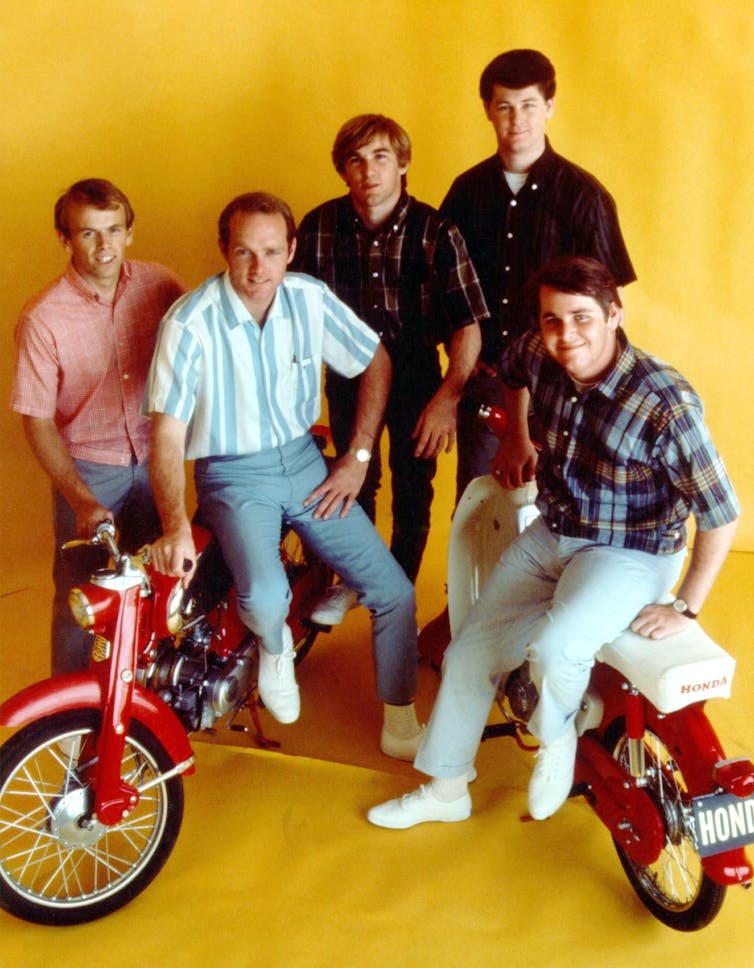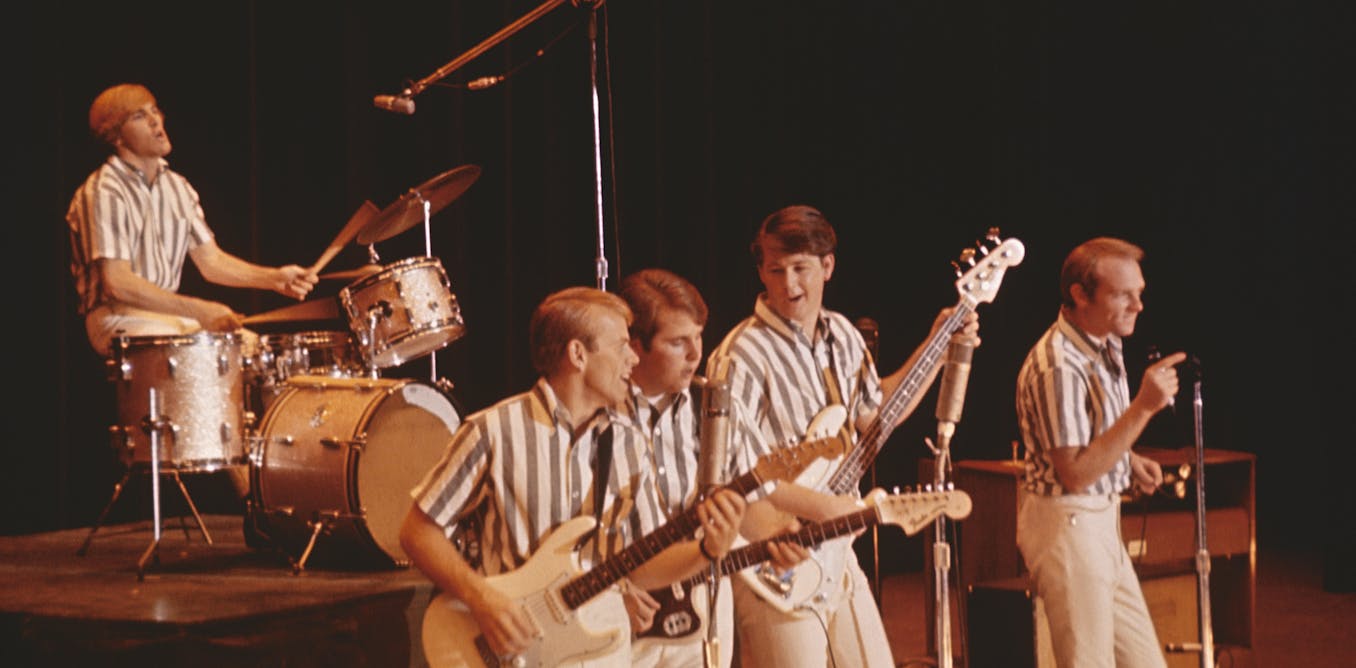In 2012, I watched as the remaining members of the Beach Boys played together for their 50th anniversary. As they launched into When I Grow Up (to be a Man), I reflected on the experience of listening to elderly men sing about what they’ll be when they “grow up”, in a band whose name never allows them to grow old.
This contrast captured the essence of the Beach Boys’ story – one of both joy and sadness, of hits and misses, and of friendship and family.
The new Disney+ documentary, The Beach Boys, is a two-hour journey through the band’s musical history, from the early days as teens playing music in the Wilsons’ garage up to the mid-1970s.
But while there are some touching moments, overall it felt like a missed opportunity to tell the band’s story in a new way and from a more modern perspective.
A six-decade long legacy
The past few years have seen a number of box sets and re-releases of the Beach Boys’ music, as well as the publication of the band’s first official biography earlier this year. The new documentary feels like part of this wider effort to document the band’s legacy while the surviving members are still able to participate.
This version of the Beach Boys’ history is mostly sunny, celebrating the band’s successes, its journey to relevance – then irrelevance – and relevance again.
However, it brushes over some of the more complex and difficult stories. Perhaps this is partly why the documentary unexpectedly stops in the mid-1970s, ending on the redemption of the band after its Endless Summer compilation and the “Brian is Back” campaign, without fully explaining where and why he had gone in the first place.
As a result, it misses some important threads of their story, including the menacing influence of Brian’s psychologist, Eugene Landy, the deaths of Dennis and Carl Wilson, the 2000s revival as Brian Wilson returned to the stage, and the coming together and subsequent fallout after the 50th-anniversary tour. This is a difficult story to tell in two hours.
While there are highlights, such as the ending with a touching reunion of the surviving band members at Paradise Cove, the documentary ultimately feels rather similar to previous documentaries on the band’s legacy.
Disney (Photo by Michael Ochs Archives/Getty Images)
The Beach Boys’ story didn’t end in the mid-1970s. In many ways, they are more loved than ever. In the past 20 years, there has been renewed interest in their music through books, articles and podcasts.
The band is still influencing new music and young artists, from the Explorers Club, to She and Him, to the brilliant new Lemon Twigs album A Dream is All We Know.
The documentary could have included some of the diverse voices from this newer generation of musicians, writers and scholars to add a fresh, exciting perspective on how their music continues to resonate.
Dreaming of an endless summer
Watching Mike, Al and Bruce tell much of the narrative in newly filmed interviews, it’s hard not to notice the absence of Brian. He appears almost entirely through archival clips like his departed brothers Dennis and Carl.
This year Brian lost his wife Melinda unexpectedly and, due to declining health, has since been placed under a conservatorship to ensure he is cared for. This absence, combined with images of Brian at the vibrant peak of his creativity, is bittersweet.

Disney (Photo by Michael Ochs Archives/Getty Images)
At the end of the documentary Carl Wilson recalls asking Brian, “Why did you think we succeeded?” To which Brian replied: “I think the music celebrated the joy of life in a real simple way.”
While this is true, the magic of the Beach Boys’ music also lies in its celebration of joyfulness despite great difficulties, and the fierce desire to keep an endless summer alive. Their story is made stronger by the acknowledgement of the turbulent tides, as well as the perfect waves.
When I was researching the Beach Boys for my doctorate, one of the most interesting findings was that the word “now” was one of the most common words used in their lyrics, especially during the early-to-mid 1960s: “let’s go surfin’ now”; “now it’s dark and I’m alone, but I won’t be afraid”.
It’s a word that explains part of why their music still resonates: the Beach Boys’ songs exist in an endless present they created for themselves and made welcome to others. Historian David Leaf calls this the Beach Boys’ “California myth” and summed up its appeal:
For kids whose oceans and beaches were made by intersecting asphalt and fire hydrants, whose winters were filled with long, cold, snowy nights, California had to be the end of the rainbow.
For many, that end of the rainbow still exists in a Beach Boys’ record. This documentary may provide an opportunity for those new to their music and history to become curious about the rest of their story.
If you’d like to listen to some of the songs featured in the Beach Boys’ documentary, along with some lesser-known tracks, listen to this curated playlist of some favourites from their early-to-mid career.

The post “New Disney documentary The Beach Boys tells the iconic band’s story – but not the whole story” by Jadey O’Regan, Lecturer in Contemporary Music, Sydney Conservatorium of Music. Co-author of "Hooks in Popular Music" (2022), University of Sydney was published on 05/29/2024 by theconversation.com




































